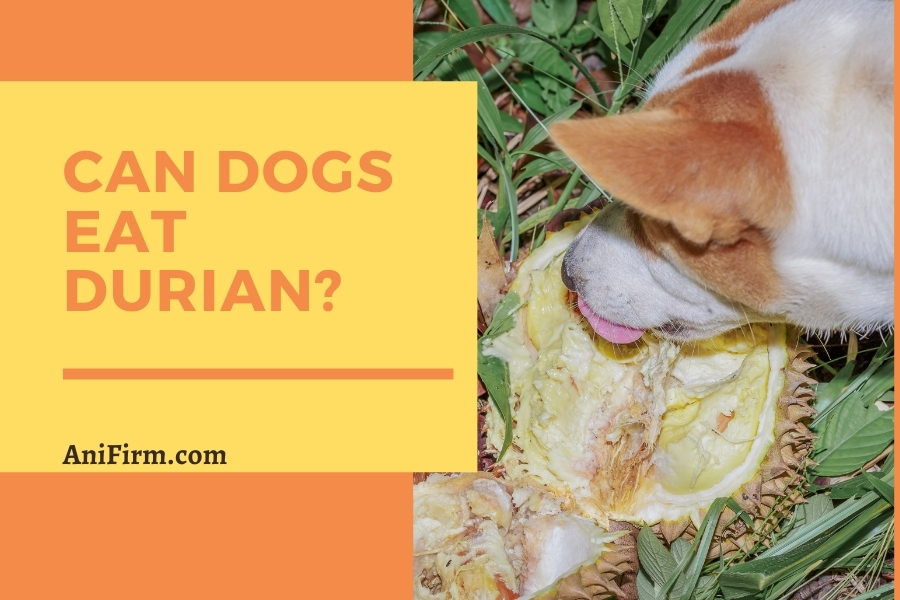Yes, they can, but be cautious of the seed!
The durian fruit may or may not be one of these delicacies. Because durians are high in fat and calories, it is not recommended to offer them to dogs, especially those that are overweight.
Though fats are an important part of a dog’s diet. If you must feed your dogs durians, feed them only a small amount and make sure they exercise to avoid fat accumulation in their bodies and to maintain their health.
Is Durian Safe for Dogs?
How about some fruit? Is Durian one of the fruits that we can share with our dogs and cats?
Our dogs can eat durian fruit without getting sick. However, there are a few things you should know before adding this people-dividing fruit to your dog’s food.
To come back to the topic at hand, the answer is yes. Durian is safe for dogs, but there are a few things to keep in mind.
Dogs Are Not Harmed Or Poisoned By Durian Fruit If
- They enjoy the flavor.
- They are given modest amounts of Durian.
- You just offer them the fruit’s soft flesh.
You’ll immediately learn whether or not your dog enjoys Durian. If your dog enjoys the flavor and smell of this fruit, you can offer it to him as a reward on occasion. However, be on the alert for signs that this herb is having an adverse effect on your dog’s digestive system.
Signs That Your Dog Has a Negative Reaction to Durian Fruit
Even if Durian isn’t harmful or dangerous to dogs, it’s likely that they won’t be able to digest it properly or that it will cause them to lose their typical vigor. If you decide to feed your dog durian fruit, you’ll want to keep a close eye on how they react after you’ve cut it open, removed the soft, mushy section, removed every seed, and determined a suitable amount.
We recommend keeping an eye out for a few of the warning indicators they may offer you. If your dog has unusually high energy levels (especially if you have a lazy dog), you’ve definitely fed them too much durian fruit, and the natural sugars are messing with their energy levels. If you and your dog don’t think this is going to work, we recommend figuring out the right amount of Durian to offer them or not feeding them at all.
If your pup has eaten durian fruit and it doesn’t entirely agree with their stomach, watch for indicators like vomiting, laziness, weariness, diarrhea, loose or bloody stool, or constipation. Even though your dog likes the taste of Durian, it’s conceivable that their system isn’t equipped to handle it. You can experience belly bloating, cramps, weakness, exhaustion, lethargy, vomiting, and other digestive disorders if your dog has gotten into the Durian and eaten entirely too much of it.
How Much Durian Can Dogs Eat?
There are three major reasons why you should limit your dog’s durian consumption.
- To begin with, Durian, like other fruits, is high in natural carbohydrates. Too much sugar can trigger dangerous blood sugar increases and possibly diabetes. Sugary foods should not be given to your dog in excess.
- Second, while Durian includes a lot of sugar, it also has a surprising amount of fat. You don’t want to overfeed your dog with high-fat foods. Consider that for a moment. What would happen if you eat sugary, fatty foods all day? You’d gain weight. That is also true for your dog.
- Finally, there’s something else to know about Durian that has to do with cardiovascular health. As a result, it appears that consuming a considerable amount of durian fruit can increase heart rate. It’s possible that this impact can be seen in other animals.
It also stands to reason that a canine would require far less Durian than a human to get this effect. As a result, you should only feed your dog extremely little amounts of Durian. As a result, durian fruit is best enjoyed as a treat rather than a meal.
Only a few bites of Durian should be fed to your dog per dish. Durian should not be consumed on a regular basis. Give your dog Durian only a couple of times per week.
Durian Is Good For Dogs’ Health.
Fruits like Durian can provide essential nutrition to your dog’s diet if fed in moderation. Durian fruits are high in the following nutrients, according to certain nutritional data:
| Durian Nutrition | Values per (243 grams) |
|---|---|
| Niacin | 13% |
| Magnesium | 18% |
| Copper | 25% |
| Folate | 22% |
| Calories | 357 |
| Fiber | 9 grams |
| Vitamin B6 | 38% |
| Thiamine | 61% |
| Protein | 4 grams |
| Fat | 13 grams |
| Vitamin C | 80% |
| Carbs | 66 grams |
| Riboflavin | 29% |
| Potassium | 30% |
| Manganese | 39% |
Conclusion
The answer is straightforward: the flesh of the durian fruit is okay to feed to a pet dog, but the seeds, rind, leaves, and stem are not. Because of the high-fat content of Durian, as well as the sugar and potential cardiovascular risks associated with big amounts, you should limit your dog’s portion sizes to only a single treat.
If your dog eats Durian, he’ll get more vitamins, minerals, and antioxidants, which will benefit his health. He’ll be grateful to you for sharing the world’s most revolting fruit with him.
Do take a look at our guide what fruits can dogs eat for more food options.
